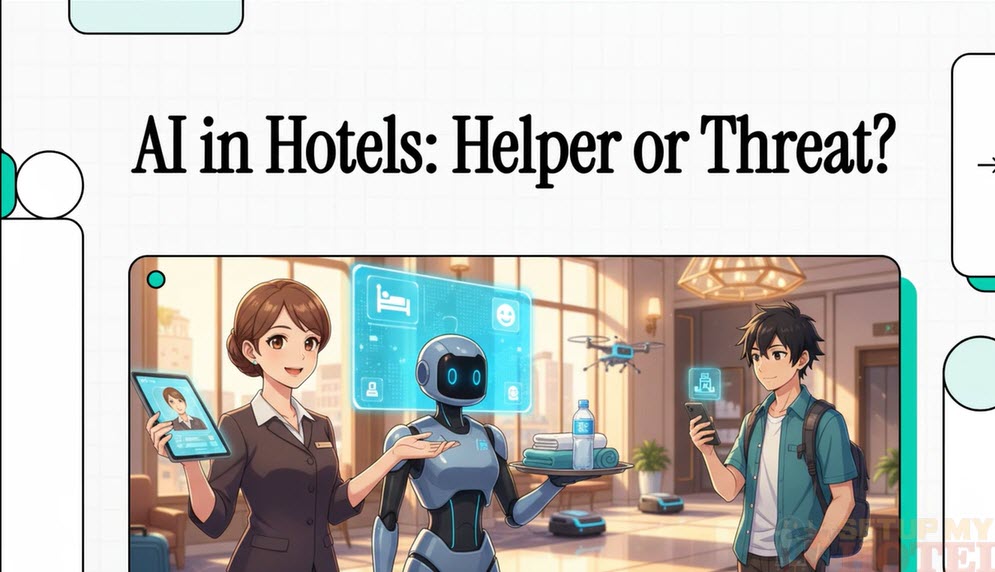Picture this: You step into a hotel lobby, tired from a long journey, and a personalized greeting maybe even a robot delivering your bags meets you instantly. Your room knows your preferred temperature and lighting before you even insert a key. This isn’t science fiction; it’s the future of hospitality powered by Artificial Intelligence (AI).
AI is breaking new ground in travel, aiming to enhance the guest experience, streamline operations, and boost overall convenience. But as algorithms get smarter, the hospitality industry is grappling with an urgent question: Is this powerful technology a helpful partner, or a threat to the jobs and personalized service the industry is built upon?
Let’s dive into both sides of this coin.
The Helper: AI as Your Best Staff Member
AI is fundamentally reshaping how hotels operate and interact with guests, primarily by handling what humans often find cumbersome: repetition, scale, and speed.
1. The Power of Personalization
AI excels at data analysis, which translates directly into hyper-personalized guest experiences. By analyzing booking history, social media, and previous behaviors, AI systems can tailor room settings, recommend local dining, or suggest spa treatments before you even ask.
• Case in Point: Virgin Hotels implemented an AI-driven platform that analyzes guest data to tailor room environments and recommend personalized services like events or dining options. Similarly, Aloft Hotel introduced “Botlr” (A.L.O.), a robotic butler that handles routine deliveries, adding a futuristic element to the stay.
2. Efficiency Behind the Scenes
For hotel operators, AI is a tool for efficiency and profitability.
• Round-the-Clock Service: AI chatbots and virtual assistants (like those used by Marriott and Hyatt, or Hilton’s Connie robot concierge) offer instant, 24/7, multilingual support, answering routine questions like check-in times or directions. This dramatically reduces wait times for guests and frees up human staff.
• Operational Streamlining: AI can automate tedious daily tasks, such as managing reservations, billing, and check-ins. CitizenM uses AI-driven self-service kiosks that allow guests to check in in just 60 seconds.
• Revenue Optimization: AI-driven dynamic pricing systems analyze massive amounts of data including competitor prices, local events, and demand projections in real time to adjust room rates, maximizing revenue per available room (RevPAR) and maintaining a competitive edge.
The Threat: Where AI Causes Anxiety and Friction
Despite its powerful capabilities, AI introduces significant challenges centered on workforce concerns and the intrinsic nature of hospitality.
1. The Loss of the Human Touch
The single biggest concern consumers express about AI in hospitality is the loss of human touch. Hospitality is inherently a people-driven business. Guests value personalized, empathetic service.
AI systems, constrained by algorithms and pre-defined rules, struggle with true empathy, creative problem-solving, and handling unique guest requests that require human judgment. When service feels cold, mechanical, or inflexible, guest satisfaction suffers. For example, if a restaurant is fully booked, a human concierge might use personal connections to secure a table, something an AI cannot easily replicate.
2. Job Displacement and Insecurity
The introduction of automation raises profound fears among hotel staff. An OysterLink poll found that 52% of hospitality professionals believe AI is more likely to displace existing jobs than create new ones.
For frontline workers housekeepers, front desk agents, food servers—who make up the backbone of the industry, technology has the potential to augment or replace up to 70% of tasks in the coming decades. This job insecurity can lead to stress, burnout, and higher turnover intentions among employees. While some jobs (especially those involving repetitive tasks) are prone to automation, the industry must prepare for new, hybrid roles that demand continuous training.
3. Privacy and Ethical Risks
AI relies on collecting and analyzing vast amounts of sensitive guest information, creating a significant challenge related to data privacy and security. This tension is often called the Personalization-Privacy Paradox.
Hotels must implement robust protocols, adhere strictly to regulations like GDPR, and maintain transparency about how guest data is used to build trust. Furthermore, AI systems risk perpetuating human-programmed biases, potentially leading to discriminatory outcomes if not regularly audited and managed ethically.
Finding the Balance: The Future is Human-Augmented
The consensus among industry leaders is clear: the future of hospitality is not about replacing people entirely, but about achieving a synergistic balance a “phygital” world that blends physical service with digital convenience.
The ideal strategy is to let AI handle the transactional tasks, freeing humans to focus on the emotional ones.
1. AI for Efficiency, Humans for Empathy: Use AI to manage bookings, directions, quick inquiries, and check-ins. Empower human staff to focus on sensitive, high-value moments like service recovery, resolving complex complaints, or creating special, memorable personal touches.
2. Training is Essential: Hotels must invest in staff training to equip employees with the skills needed to work alongside AI. Staff should be able to interpret the insights AI provides (e.g., guest preferences flagged by the system) to deliver genuine, personalized interactions.
3. Invisible Technology, Visible Care: The most successful models integrate technology so seamlessly that it disappears into the background. AI acts as a silent co-pilot, orchestrating complex workflows like alerting the night manager and reallocating a room for a late-arriving guest so that the guest only notices the warm, personalized welcome from a smiling human employee.
The goal is an elevated humanity. AI takes care of the routine, but the ultimate differentiator remains the human connection. The hotel of the future won’t be one where robots replace the receptionist; it will be one where the receptionist becomes more powerful, more present, and more human because the robot took care of the rest.
AI in hospitality is like a powerful, tireless engine: it handles the long, repetitive journeys (automation and data analysis) flawlessly. But the human staff remains the skilled driver, steering the experience with wisdom, empathy, and personalized attention, ensuring every guest arrives exactly where they want to be.
